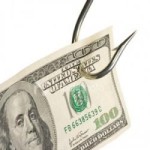Bad Comparisons: Economic Value of Recreational vs. Commercial Fishing
Today’s feature, by one of the great spokesmen for American sportfishing Rip Cunningham, originally was published by the Theodore Roosevelt Conservation Partnership, www.trcp.org.
By Rip Cunningham
from The Fishing Wire
Most importantly, the overall economic statistics show a completely different picture. These may vary from region to region and fishery to fishery, but lets look at the numbers in aggregate. Recreational anglers comprise about 97% of the resource users and take about 3% of the resource. However, from that 3% they generate substantially more economic activity than the 3% of commercial users do from the 97% of the resource. Given those numbers it is amazing that every single allocation decision does not go to the recreational user. But they don’t because “recs just play with their food”. But that message has not seen a lot of promotion.
Saltwater sport fishing makes up a substantial portion of the overall numbers. In 2011, about 9 million salt water anglers fished for almost 100 million days. This activity generated about $13.5 billion in retail sales, over $32 billion in economic activity, about $10 billion in wages, and almost 250,000 jobs. While we are not a big fan of taxes, when they are used to enhance the activity that pays them, they are beneficial. Marine anglers generated $2.3 billion in federal tax revenue and almost another $2 billion to the states. Wow! If the sport fishing industry were a single business, it would be ranked 51st on the Fortune 500 ™ list. If that is the benefit of “a bunch of guys playing with their food,” bring it on.
The economic activity generated by sport fishing does not just benefit the manufacturers of tackle, marine electronics, boats, and motors. It supports many rural communities along our coasts. Fishing is part of their heritage. More than most, they understand the need to maintain healthy ecosystems and sustainable resources. Those two things have formed their history and will maintain their future.
Sport fishing participants love to catch fish both for fun and for a healthy source of protein. They also understand the need to protect and enhance the environments that support fish. They realize that no fish means no fishing.
Anglers contribute to the funding of our nation’s fisheries conservation and environmental improvement in a number of ways. This past year, 2012, marked the 75th anniversary of a conservation funding system that is envied throughout the world. The Sport Fish Restoration and Boating Trust Fund in 2010 generated $390 million from excise tax on fishing tackle and from the transfer of boat fuel tax back to the trust fund. This money is apportioned back to states by a formula based on metrics of fishing activity. License sales in 2010 also generated $657 million used by states to operate their fish and wildlife agencies. Beyond all of that, anglers annually donate over $400 million to a variety of conservation and fishing organizations. That is an impressive tally and one of the reasons that the US has maintained generally robust fish populations and quality habitat.
Okay so the participation and economics should be a slam dunk. There is still the issue of how recreational users are compared to the commercial user. It is an unfair comparison that the recreational user will lose every time. The angler is the end user on the recreational side. They are compared to the commercial user who is one rung up the ladder. The commercial user employs people and sells a product, albeit a product that is given to them. Never is the recreational user compared to the person who walks into the supermarket to buy seafood, but that would be the correct comparison. Conversely, never is the commercial user compared to the tackle shop owner or marina owner, but that is the correct comparison. Those folks employ people and produce a product or service. They are the engine that helps generate the socio-economic benefits from the recreational use of fisheries resources.
This image has to be changed if the recreational industry wants to get its fair share in the allocation battles. So when you hear someone saying, “recs just play with their food.” You can say that recreational users are the ones who pay to play and thereby support the economy and the resource.
Make sure that your Congressional delegation and fisheries managers understand this value!
For more information:
NOAA Report-Fisheries Economics of the United States 2009
Understanding the Potential Economic Impact of Marine Recreational Fishing: California
